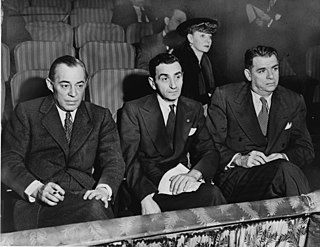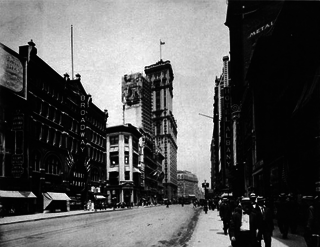
Musical theatre is a form of theatrical performance that combines songs, spoken dialogue, acting and dance. The story and emotional content of a musical – humor, pathos, love, anger – are communicated through words, music, movement and technical aspects of the entertainment as an integrated whole. Although musical theatre overlaps with other theatrical forms like opera and dance, it may be distinguished by the equal importance given to the music as compared with the dialogue, movement and other elements. Since the early 20th century, musical theatre stage works have generally been called, simply, musicals.

Rodgers and Hammerstein refers to the duo of composer Richard Rodgers (1902–1979) and lyricist-dramatist Oscar Hammerstein II (1895–1960), who together were an influential, innovative and successful American musical theatre writing team. They created a string of popular Broadway musicals in the 1940s and 1950s, initiating what is considered the "golden age" of musical theatre. Five of their Broadway shows, Oklahoma!, Carousel, South Pacific, The King and I and The Sound of Music, were outstanding successes, as was the television broadcast of Cinderella (1957). Of the other four shows that the team produced on Broadway during their lifetimes, Flower Drum Song was well-received, and none was an outright flop. Most of their shows have received frequent revivals around the world, both professional and amateur. Among the many accolades their shows garnered were thirty-four Tony Awards, fifteen Academy Awards, two Pulitzer Prizes, and two Grammy Awards.

Charles Rudolf Friml was a Czech-born composer of operettas, musicals, songs and piano pieces, as well as a pianist. After musical training and a brief performing career in his native Prague, Friml moved to the United States, where he became a composer. His best-known works are Rose-Marie and The Vagabond King, each of which enjoyed success on Broadway and in London and were adapted for film.

Jubilee is a musical comedy with a book by Moss Hart and music and lyrics by Cole Porter. It premiered on Broadway in 1935 to rapturous reviews. Inspired by the recent silver jubilee of King George V of Great Britain, the story is of the royal family of a fictional European country. Several of its songs, especially "Begin the Beguine" and "Just One of Those Things", became independently popular and have become part of the American Songbook.

Gay Divorce is a musical with music and lyrics by Cole Porter and book by Dwight Taylor, adapted by Kenneth Webb and Samuel Hoffenstein. It was Fred Astaire's last Broadway show and featured the hit song "Night and Day" in which Astaire danced with co-star Claire Luce.
Marcia Mitzman Gaven is an American actress from New York. Since studying at the High School of Performing Arts and the State University of New York at Purchase, she has appeared in many musicals during her career singing in both mezzo-soprano and soprano roles. Her Broadway debut came in 1979 when she played Betty Rizzo in Grease, serving as the replacement for the original actress of the role. In the 1980s she appeared in the musicals The Rocky Horror Show, Oliver!, Zorba, Nine, Anything Goes, Chess, and Welcome to the Club, and in the operas Brigadoon, South Pacific, and Sweeney Todd.
Patricia Neway was an American operatic soprano and musical theatre actress who had an active international career during the mid-1940s through the 1970s. One of the few performers of her day to enjoy equal success on both the opera and musical theatre stages, she was a regular performer on both Broadway and at the New York City Opera during the 1950s and 1960s.

Henry Brougham Farnie, often called H. B. Farnie, was a British librettist and adapter of French operettas and an author. Some of his English-language versions of operettas became record-setting hits on the London stage of the 1870s and 1880s, strongly competing with the Gilbert and Sullivan operas being played at the same time.

Francis Wilson was an American actor, born in Philadelphia.
"La donna è mobile" is the Duke of Mantua's canzone from the beginning of act 3 of Giuseppe Verdi's opera Rigoletto (1851). The canzone is famous as a showcase for tenors. Raffaele Mirate's performance of the bravura aria at the opera's 1851 premiere was hailed as the highlight of the evening. Before the opera's first public performance, the song was rehearsed under tight secrecy: a necessary precaution, as "La donna è mobile" proved to be incredibly catchy, and soon after the song's first public performance it became popular to sing among Venetian gondoliers.

Erminie is a comic opera in two acts composed by Edward Jakobowski with a libretto by Claxson Bellamy and Harry Paulton, based loosely on Charles Selby's 1834 English translation of the French melodrama, Robert Macaire. The piece first played in Birmingham, England, and then in London in 1885, and enjoyed unusual international success that endured into the twentieth century.

Adele Ritchie was an American prima donna of comic opera and star of Edwardian musical comedies and vaudeville. Her career began in the early 1890s and continued for nearly twenty-five years. Her life would end tragically in a murder-suicide involving a close friend.

Louise Gunning was an American soprano singer popular on Broadway in Edwardian musical comedy and comic opera from the late 1890s to the eve of the First World War. She was perhaps best remembered as Princess Stephanie of Balaria in the 1911 Broadway production of The Balkan Princess. During the war years Gunning began to close out her career singing on the vaudeville circuit.

Sydney Rosenfeld (1855–1931) was an American playwright who wrote numerous plays, and adapted many foreign plays. Close to fifty of his creations played on Broadway.

Adrienne Adele Augarde was an English actress and singer popular for nearly a decade on both sides of the Atlantic Ocean, primarily for her roles in Edwardian musical comedy.

Marie Jansen was an American musical theatre actress best known for her roles at the end of the 19th century. She starred in a number of successful comic operas, Edwardian musical comedies, and comic plays in New York, Boston, Philadelphia and London during the 1880s and 1890s.

Alberta Gallatin was an American stage and film actress active in the late 19th and early 20th centuries. During her near forty-year career she acted in support of the likes of Elizabeth Crocker Bowers, James O’Neil, Edwin Booth, Joseph Jefferson, Thomas W. Keene, Richard Mansfield, Sir Johnston Forbes-Robertson, Minnie Maddern Fiske, Otis Skinner, Maurice Barrymore, Joseph Adler, E. H. Sothern and James K. Hackett. Gallatin was perhaps best remembered by theatergoers for her varied classical roles, as Mrs. Alving in Henrik Ibsen's domestic tragedy Ghosts and the central character in the Franz Grillparzer tragedy Sappho. Counted among her few film roles was the part of Mrs. MacCrea in the 1914 silent film The Christian, an early 8-reel production based on the novel by Hall Caine.

The Broadway Theatre near 41st Street was a Manhattan theatre in operation from 1888 to 1929. It was located at 1445 Broadway.

The Merry Monarch is an 1890 comic opera that debuted at the Broadway Theatre in New York City. It is an English adaptation of L'étoile by J. Cheever Goodwin, with new music by Woolson Morse.

















